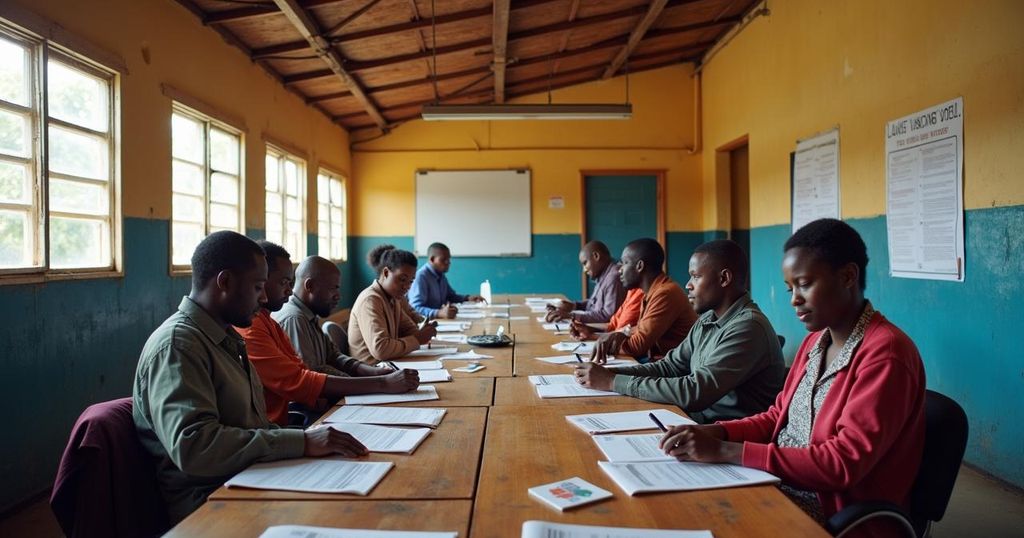Mozambique Awaits Election Results as Ruling Party Seeks Extended Reign
Mozambique awaits the results of the general elections held on October 9, 2024, where the ruling Frelimo party aims to extend its nearly 50-year control. Allegations of electoral fraud have emerged from opposition candidates amidst reports of peaceful voting. Daniel Chapo is the Frelimo candidate favored to succeed President Filipe Nyusi, while independent candidate Venancio Mondlane presents a significant challenge, especially among young voters dissatisfied with the government. Preliminary results are expected soon, but concerns regarding the electoral process remain.
Mozambique is currently awaiting the outcome of its recent general elections held on October 9, 2024. The ruling Front for the Liberation of Mozambique (Frelimo) party is poised to maintain its long-standing dominance, which has lasted nearly half a century since independence from Portugal in 1975. Despite a mostly peaceful electoral process, opposition candidates have raised serious allegations of electoral fraud and malpractice, asserting that there were issues such as unsealed ballot boxes and restricted access for their monitors to verify the integrity of the voting. As officials began counting votes following the closure of polling stations in the evening hours, preliminary results are expected in the coming days. The eventual confirmation of these results will be submitted to the Constitutional Council within a designated 15-day period for official ratification. The presidential candidate for Frelimo, Daniel Chapo, is the anticipated successor to the current President Filipe Nyusi. Chapo, a relatively new figure in Mozambican politics at the age of 47, secured the nomination through a surprising victory in an internal process earlier in May. His main rival appears to be independent candidate Venancio Mondlane, who has garnered significant support among the youth for his stance against unemployment and governmental corruption. The electoral landscape has been marred by concerns surrounding the conduct of the elections, with Mondlane and other opponents asserting that the ruling party has a history of manipulating the electoral process. This sentiment of mistrust is compounded by the recent history of violence following local elections won by Frelimo. The European Union’s observer team reported that while no major disturbances were noted on the election day itself, it remains too early to draw definitive conclusions regarding the legitimacy of the election. Reports from local monitoring groups have expressed concern over the limitations placed on party delegates, who were barred from observing the polls. Mozambique faces numerous challenges, including economic pressures exacerbated by a jihadi insurgency in Cabo Delgado province, which has caused widespread displacement and stalled significant economic projects. The nation navigates a complex political landscape where Frelimo, after establishing its authority as a one-party state, continues to contend with its past conflicts with opposition factions, notably the rebel group Renamo. The election encompassed the presidential race, parliamentary representation, and the selection of provincial governors, and it drew participation from four candidates: Daniel Chapo, Venancio Mondlane, Ossufo Momade from Renamo, and Lutero Simango from the Mozambique Democratic Movement.
Mozambique’s political history is marked by the enduring rule of the Frelimo party, rooted in its liberation movement against Portuguese colonial rule. Since independence in 1975, the country has undergone significant transitions, including the establishment of a multi-party system post-1994, following a 15-year civil conflict. The nation has faced challenges such as political instability, poverty, and ongoing insurgent threats, particularly in the northern region. The current elections are important in determining the future political landscape as the ruling party seeks to extend its reign past 50 years. The political atmosphere leading up to the elections was charged, with distrust towards Frelimo due to historical accusations of electoral fraud and recent unrest following local elections. The participation of independent candidates like Venancio Mondlane, who resonate with younger voters, adds complexity to the political dynamic. As the nation counts the votes, the legitimacy of the electoral process will play a critical role in future governance and social stability.
In conclusion, the recent elections in Mozambique present a pivotal moment for the nation as it navigates the challenges of political integrity and public trust. The Frelimo party, with its continued dominance, faces rising scrutiny from opposition figures and a disillusioned youth electorate. If allegations of electoral misconduct are substantiated, it may lead to further social unrest and a re-evaluation of governance in the country. The coming days will reveal the initial election results, which are crucial for the political landscape and economic stability of Mozambique.
Original Source: apnews.com




Post Comment